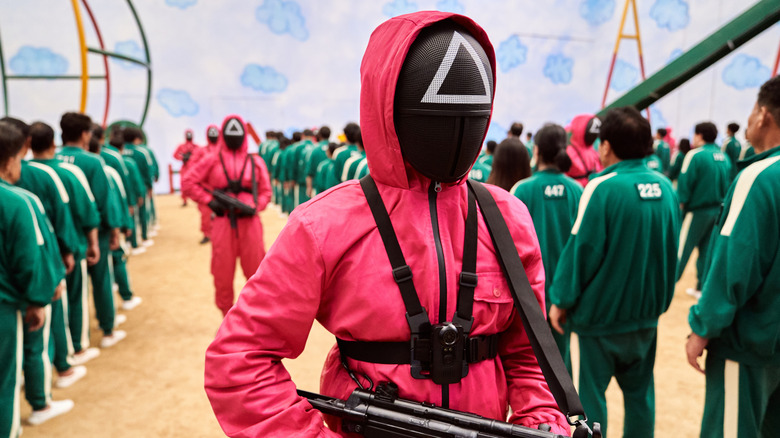This Is How Long It Really Took To Get Squid Game Made
"Squid Game," Netflix's sensational, squirm-inducing South Korean thriller series that's topped the streaming service's daily Top 10 charts all over the world since it was released on September 17, is on track to become Netflix's most-watched series ever, outpacing global megahits "Bridgerton" and "Lupin," according to the Wall Street Journal.
The show's success has come as a surprise to just about everyone, because for a long time, no one wanted "Squid Game." Creator Hwang Dong-hyuk came up with the show more than a decade ago. He told the Korean publication Cine21 that he had the initial idea in 2008 and wrote it in 2009. When he would pitch the series back then, potential investors balked at the violence and what they felt was an implausible premise, he told the Wall Street Journal. They didn't believe that people would face almost certain death to compete for the chance to win money.
Hwang knew it wasn't so farfetched. When he devised the series, he was living with his mother and grandmother and so strapped for cash that at one point, he had to sell the laptop he was using to write the script. He knew from firsthand experience the kind of desperation his debt-saddled characters who agree to play the deadly game are facing. He just had to wait for the world to be ready to accept his idea.
The world wasn't ready for Squid Game a decade ago
The world did catch up. Income inequality and class consciousness have become a major political talking point over the past decade, and the pandemic has only exacerbated the gulf between the haves and the have-nots –- Hwang pointed out to the WSJ that even vaccine rollouts depend on whether a country is wealthy or not. Netflix commissioned the series two years ago, with no way to know that it would be arriving at a future moment when its themes would be even more timely. "Squid Game" hit at exactly the right time, when people were ready and able to engage with its themes of structural economic insecurity.
"The world has changed," Hwang said. "All of these points made the story very realistic for people compared to a decade ago."
At the same time, South Korea has become a major exporter of culture. "Parasite," the 2019 Korean thriller with similar themes about inequality, won the Academy Award for Best Picture, which helped pave the way for "Squid Game" to be a success. Netflix has invested heavily in South Korean content, spending $500 million this year alone. The effort has paid off globally – about 95% of "Squid Game" viewers are outside of South Korea.
In retrospect, it's surprising that anyone thought "Squid Game" wouldn't be a success. It's a dystopian thriller with bold visuals and universally relevant themes, which seems like a streaming slam dunk. However, it's good that it took so long, because if it had come out in, say, 2014, it wouldn't have hit so hard.

